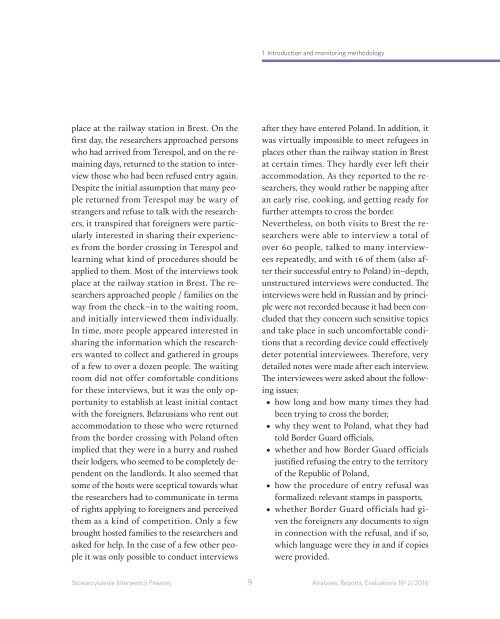At the border
at-the-border
at-the-border
Create successful ePaper yourself
Turn your PDF publications into a flip-book with our unique Google optimized e-Paper software.
1. Introduction and monitoring methodology<br />
place at <strong>the</strong> railway station in Brest. On <strong>the</strong><br />
first day, <strong>the</strong> researchers approached persons<br />
who had arrived from Terespol, and on <strong>the</strong> remaining<br />
days, returned to <strong>the</strong> station to interview<br />
those who had been refused entry again.<br />
Despite <strong>the</strong> initial assumption that many people<br />
returned from Terespol may be wary of<br />
strangers and refuse to talk with <strong>the</strong> researchers,<br />
it transpired that foreigners were particularly<br />
interested in sharing <strong>the</strong>ir experiences<br />
from <strong>the</strong> <strong>border</strong> crossing in Terespol and<br />
learning what kind of procedures should be<br />
applied to <strong>the</strong>m. Most of <strong>the</strong> interviews took<br />
place at <strong>the</strong> railway station in Brest. The researchers<br />
approached people / families on <strong>the</strong><br />
way from <strong>the</strong> check–in to <strong>the</strong> waiting room,<br />
and initially interviewed <strong>the</strong>m individually.<br />
In time, more people appeared interested in<br />
sharing <strong>the</strong> information which <strong>the</strong> researchers<br />
wanted to collect and ga<strong>the</strong>red in groups<br />
of a few to over a dozen people. The waiting<br />
room did not offer comfortable conditions<br />
for <strong>the</strong>se interviews, but it was <strong>the</strong> only opportunity<br />
to establish at least initial contact<br />
with <strong>the</strong> foreigners. Belarusians who rent out<br />
accommodation to those who were returned<br />
from <strong>the</strong> <strong>border</strong> crossing with Poland often<br />
implied that <strong>the</strong>y were in a hurry and rushed<br />
<strong>the</strong>ir lodgers, who seemed to be completely dependent<br />
on <strong>the</strong> landlords. It also seemed that<br />
some of <strong>the</strong> hosts were sceptical towards what<br />
<strong>the</strong> researchers had to communicate in terms<br />
of rights applying to foreigners and perceived<br />
<strong>the</strong>m as a kind of competition. Only a few<br />
brought hosted families to <strong>the</strong> researchers and<br />
asked for help. In <strong>the</strong> case of a few o<strong>the</strong>r people<br />
it was only possible to conduct interviews<br />
after <strong>the</strong>y have entered Poland. In addition, it<br />
was virtually impossible to meet refugees in<br />
places o<strong>the</strong>r than <strong>the</strong> railway station in Brest<br />
at certain times. They hardly ever left <strong>the</strong>ir<br />
accommodation. As <strong>the</strong>y reported to <strong>the</strong> researchers,<br />
<strong>the</strong>y would ra<strong>the</strong>r be napping after<br />
an early rise, cooking, and getting ready for<br />
fur<strong>the</strong>r attempts to cross <strong>the</strong> <strong>border</strong>.<br />
Never<strong>the</strong>less, on both visits to Brest <strong>the</strong> researchers<br />
were able to interview a total of<br />
over 60 people, talked to many interviewees<br />
repeatedly, and with 16 of <strong>the</strong>m (also after<br />
<strong>the</strong>ir successful entry to Poland) in–depth,<br />
unstructured interviews were conducted. The<br />
interviews were held in Russian and by principle<br />
were not recorded because it had been concluded<br />
that <strong>the</strong>y concern such sensitive topics<br />
and take place in such uncomfortable conditions<br />
that a recording device could effectively<br />
deter potential interviewees. Therefore, very<br />
detailed notes were made after each interview.<br />
The interviewees were asked about <strong>the</strong> following<br />
issues:<br />
• how long and how many times <strong>the</strong>y had<br />
been trying to cross <strong>the</strong> <strong>border</strong>,<br />
• why <strong>the</strong>y went to Poland, what <strong>the</strong>y had<br />
told Border Guard officials,<br />
• whe<strong>the</strong>r and how Border Guard officials<br />
justified refusing <strong>the</strong> entry to <strong>the</strong> territory<br />
of <strong>the</strong> Republic of Poland,<br />
• how <strong>the</strong> procedure of entry refusal was<br />
formalized: relevant stamps in passports,<br />
• whe<strong>the</strong>r Border Guard officials had given<br />
<strong>the</strong> foreigners any documents to sign<br />
in connection with <strong>the</strong> refusal, and if so,<br />
which language were <strong>the</strong>y in and if copies<br />
were provided.<br />
Stowarzyszenie Interwencji Prawnej 9<br />
Analyses, Reports, Evaluations Nº 2/2016


